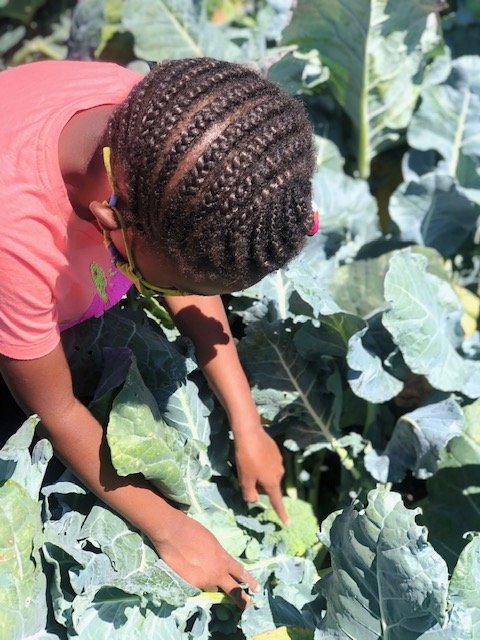How To Save Money As A Vegan At The Grocery Store
Me and a lovely bell pepper that I bought at a local Farmer’s Market
Want to go vegan, but think it's too pricey?
I feel ya. Initially it hurt to fork over about $3 a pound for organic produce. But when I thought about how much I'd willingly dished out for "premium meat" in the past, like a $20 a steak, I had to check myself.
Why are we so willing to pay top dollar for stuff that may taste good in the moment, but aren't as beneficial in the long run? Fruits and veggies need better PR, I tell ya!
Our veggie bounty from Underwood Family Farms
If you’re looking to save money at the grocery store as a vegan or plant-based shopper, here’s a few simple tips:
Buy in bulk! Grab staples like rice, beans, and nuts in bigger quantities for a better price from stores like Costco, Sam's Club or online.
Rely on the Clean 15/Dirty Dozen list when buying produce: Annually the Environmental Working Group lists the top 15 clean foods grown with the least amount of pesticides. They also reveal 12 that are sprayed with the most pesticides. Use their guide when deciding which organic or non-organic produce to buy and you may shave off a few extra bucks.
Buy frozen produce: It’s more economical and frozen produce has a longer shelf life.
Trim back on the amount of processed foods, meat, and dairy substitutes you buy: Costs can rival real meat. Use mushrooms or beans to make your own. Here’s a few good meat substitute recipes.
Reframe your meal mentality: When meal planning reframe the standard meat/veggie/carb plate. Think legume/veggie/starch. This is key! After the reframe, meal prep and write your grocery list before you shop, to stay focused and avoid overbuying.
Invest in a water filter: You’ll save money and plastic when you avoid buying bottled water.
Use recyclable or cotton mesh produce bags while shopping: If you shop with plastic, remove your produce from the bags before refrigerating, to maintain freshness.
Refrigerate your produce: Don't wash your fruits and veggies until you're ready to eat them, to extend their shelf life.
Shop small, local & cultural: Buy specialty items from speciality stores. For larger grocery hauls, stick to smaller chains like Sprouts or Fresh Thyme. They have lower prices and a higher inventory of fresh foods. Depending on your city and accessibility, you can also save money by purchasing from your local Farmer’s Markets and Mom & Pop stores. Often smaller, family owned, ethnic grocery stores have lower prices on items like spices, hummus, noodles, and specialty fruit, like plantains, papayas, mangos, avocados and melons.
My daughter picking fresh broccoli at Underwood Family Farms
When you UP your plant intake, you can reduce your grocery bill. Vegans save an average of $23 weekly at the store, which adds up to over $1100 in savings annually!
Sure, being vegan can be expensive if you supplement your diet with "products" instead of whole foods, like processed goods, meat substitutes, or eating out a ton. But the same can be true if you’re not plant-based. The key to the mystery is to buy more plants, not products.
Grabbing green beans at the Farmer’s Market
thanks to inflation, it now costs about 10% more to buy groceries than it did last year. But since I've gone vegan, and my family is more plant-based, we still come out on toP. you can too! Here's how:
Meat is expensive: We've reduced the amount of meat, poultry, eggs and dairy that we buy. Meat and dairy is now nearly 14% more expensive than it was a year ago. The biggest spikes in food include eggs, chicken, bacon and beef. A two pound package of ground beef cost about $10 last year. Today it’s just under $12.
Plants are cheaper: We buy more fruits and veggies! Produce is not immune to rising inflation costs, but it hasn’t been hit as hard. Veggies are now 6% more than they cost last year. Not great, but it still beats 14%!
Vegan life is inflation proof: Even when inflation prices level out, vegan meals will still cost 40% less than meat-forward meals.
We save time: Vegan meals take less time to prep overall. No one wants overcooked veggies! On average a vegan lunch takes 12 minutes to prepare, versus a meat meal, which takes about 20 minutes.
Preventative health saves: In general, plant-based folks often save on healthcare expenses in the long run, by taking the lead on their preventative health. Not all, but many healthy vegans often have lower healthcare and medicine costs.
When you make a positive environmental impact, everyone wins: According to the Sharpener.net, if you go vegan for a month, you save the lives of 30 animals, 620 pounds of carbon dioxide emissions, 913 square feet of forests, and 33,481 gallons of water on average. Amazing!
Shopping in the sun at the Farmer’s Market
We’vE seen a decrease in our grocery bill since I went vegan and can attest to how good those savings feel on our pockets!
My goal is to not only get my household to be 100% plant-based, it’s also to trim back on the processed meat substitutes that we buy, so that we can fully skip in the sun!
Plant-based moms, have you seen your grocery bills decrease? Connect with me on Instagram. I’d love to hear about your experience.
Thanks for reading! For more resources for busy moms who want to lead healthier, plant-based lives: Follow me @getmommafied on Instagram, and subscribe to my bimonthly Mommafied Note.





